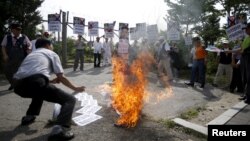North Korea on Saturday demanded that the South halt anti-North propaganda broadcasts via loudspeakers along the border or face military action, a day after it denied Seoul's accusation that it had planted land mines that wounded two South Korean soldiers.
Tension on the Korean peninsula has escalated since the land mine explosion last week and as the U.S. and South Korean militaries prepare to begin annual joint exercises.
South Korea has threatened countermeasures and on Monday began using loudspeakers to blare anti-Pyongyang rhetoric across the border, resuming broadcasts that had been suspended since 2004.
South Korea's defense minister told parliament Thursday that Seoul would expand the scale of the broadcasts to all front-line bases, and planned to remove trees along the demilitarized zone (DMZ) to get a better view.
"The resumption of the broadcasting is a direct action of declaring a war against the DPRK," the Front Command of the Korean People's Army said in a statement Saturday carried by the state KCNA news agency. North Korea's official name is the Democratic People's Republic of Korea.
Failure to halt the broadcasts will result in military action "to blow up all means for 'anti-north psychological warfare' " along the front, it warned.
"They should not forget that the KPA military action means indiscriminate strikes which envisage even possible challenge and escalating counteraction," it said.
U.S. and South Korean forces on Monday begin annual joint military exercises, which Pyongyang condemns as a preparation for war.
North and South Korea are technically still at war as the 1950-53 Korean War ended in an armistice, not a peace treaty.
The DMZ is a 4-kilometer-wide (2.5 miles) buffer fortified with land mines and barbed wire stretching across the Korean Peninsula, with more than 1 million soldiers and heavy military equipment deployed on both sides.
